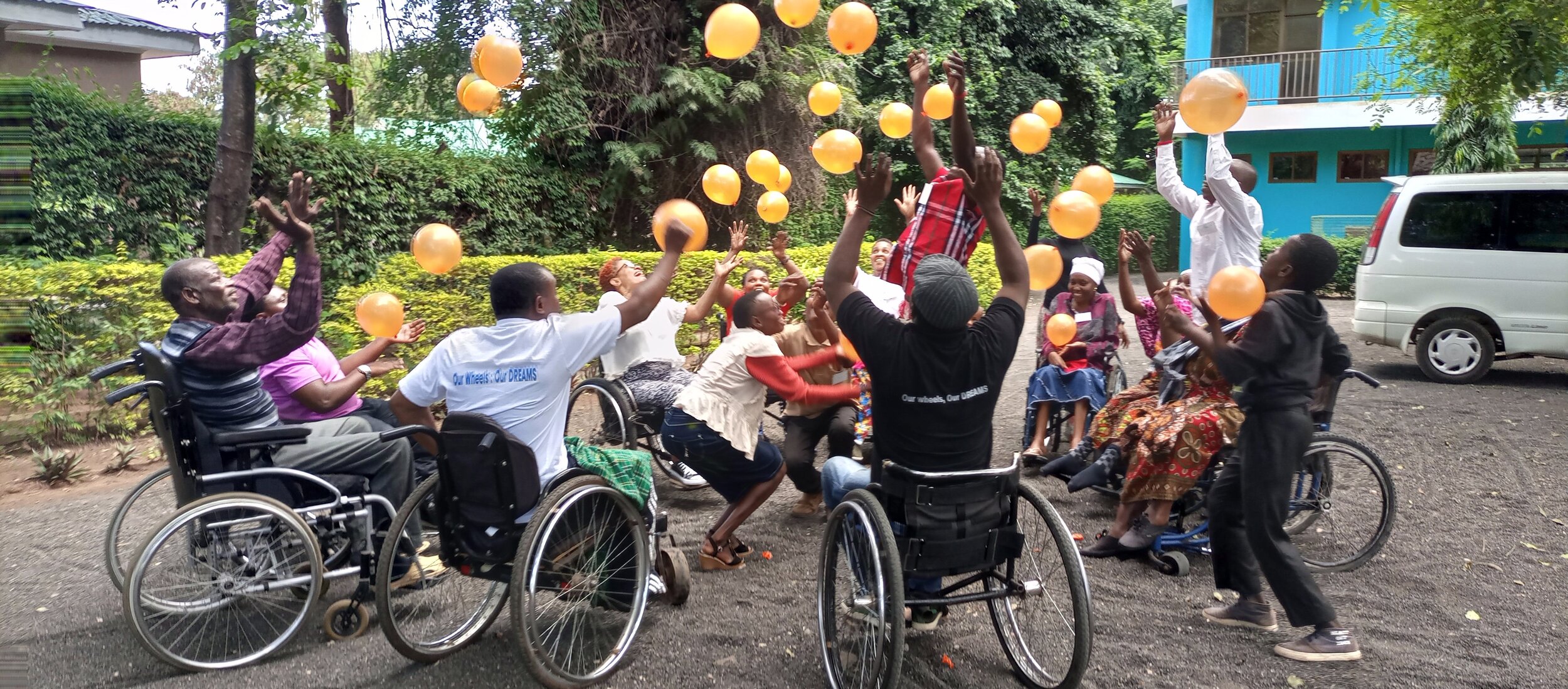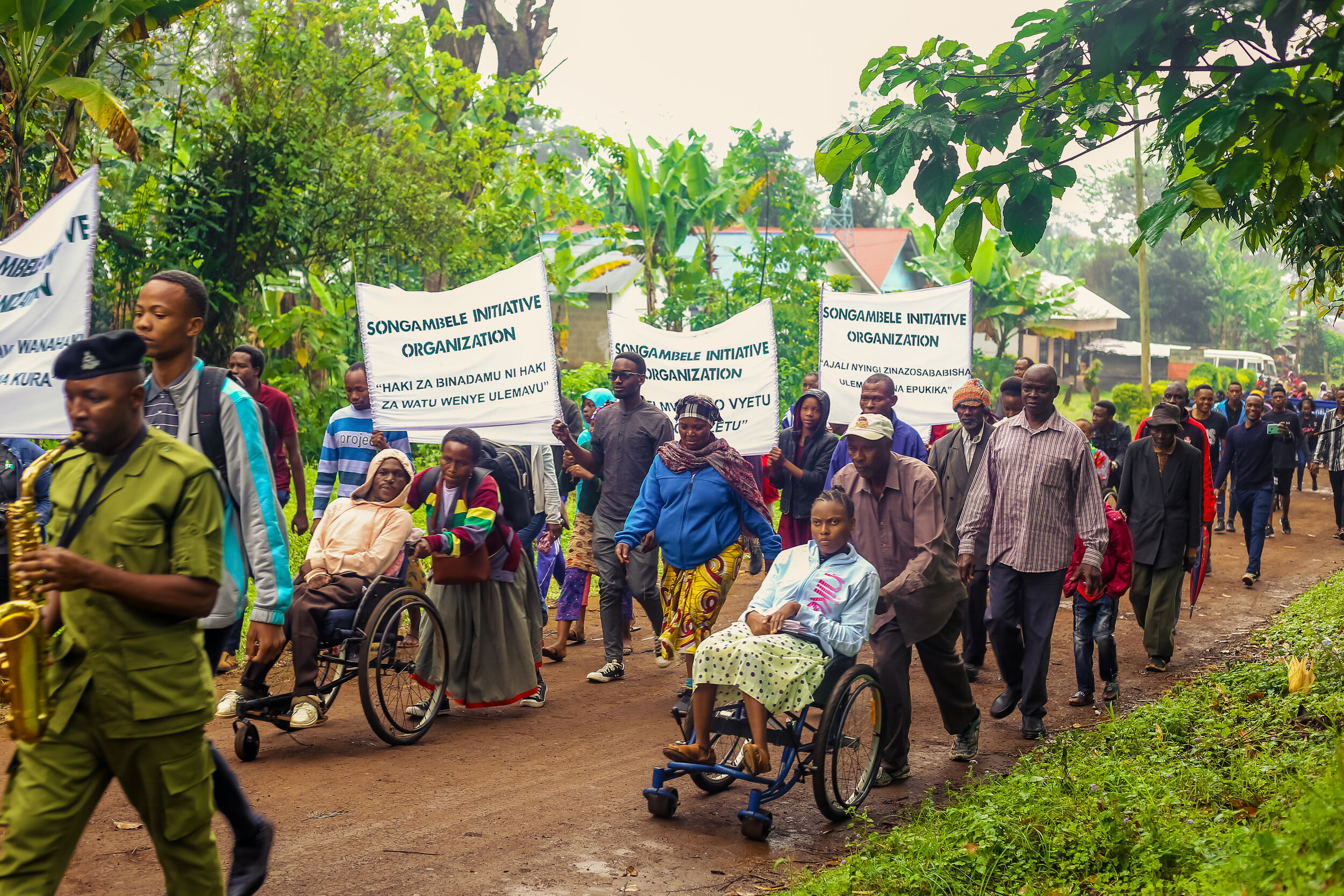2020 ANNUAL REPORT
WE ARE AND WE WILL. INCLUDE US!
A MESSAGE FROM THE FOUNDER
Thank you for making Songambele’s success!
“OUR WHEELS,OUR DREAMS!”
Your support helps us achieve our mission breaking down barriers faced by all people with spinal cord injuries (SCI) and empowering women and children with disabilities. In many places in Tanzania, the life expectancy of someone after a spinal cord injury (SCI) is only 18 months. Due to the lack of proper information about SCI, most of people die of primary complications like Urinary Tract Infection and pressure ulcers. Your contribution is saving lives!
Despite the limitations brought by COVID in 2020, Songambele spoke with thousands of people across dozens of communities and directly helped over 100 individuals. Just think of all the things we can accomplish with your continued support in 2021!
Let’s start with a story to demonstrate the joy your contributions make possible….
Faustina Urassa
Founder & Executive Director
A CASE STORY - INTRODUCING BARAKA
Baraka Omary, 29, lives outside of Moshi, in North East Tanzania in Narumu village. He was born with a disability leaving him unable to walk and has never received information or treatment. As he grew, he witnessed his younger brothers, sisters and neighbors going to school and church while he was able only to sit or crawl at home. As Baraka grew, he became too large for his mother to carry and had to rely on a younger brother.
When Songambele met Baraka and his mother in September 2020, his mother cried. She had never seen people with disabilities as independent as our Peer Supporters. Her only wish was for a wheelchair to allow Baraka to live an independent life too. Baraka also wanted his independence because he worried what would happen when his brother was no long able to carry him.
Imagine their happiness when Songambele presented Baraka with a new wheelchair! Baraka said, “With this wheelchair, I am new now!
Songambele has completely changed my life from zero to hero. I have seen the world and I feel like a human being now.”
OUR PROGRAMMS
Community Outreach
Visibility is important because when people see Songambele beneficiaries participating as active and equal community members, they learn to respect and value people with disabilities. Songambele led 25 participants with disabilities at the Kilimanjaro Marathon in June. Over 10,000 people saw us cross the 5km finish line, where news sources sought interviews with our beneficiaries, spreading their stories and raising awareness about Songambele’s services.
Visibility is even more important in rural areas where the lack of infrastructure makes it more difficult for people with disabilities to navigate outside their homes. That’s why when rural communities plan events, we show up! We spoke, participated and spread awareness at events such as International Women’s Day (March 8) in Moshi, International Day for Spinal Injury (September 5) in the Lyamungo kati village and International Disability Day (December 3) in Bomang’ombe
“I was inspired by Faustina Urassa [Songambele CEO] when she said she was able to conceive and have a child when she was in a wheelchair. This inspired me to have a child of my own and I was now very sure that being in a wheelchair is not an obstacle. I realized my dream. My daughter is now 5 years old and just started primary school.”
- Teddy, paralyzed from the neck down when she was 14 years old
Sports
Playing games at the KCMC compound
Almost 2,000 individuals participated in sports programs regularly held by Peer Supporters in communities and hospitals. Peer Supporters also use sports to relate with children while visiting schools. Not only does this teach acceptance and help break down stereotypes at an early age, but we often are connected to people with disabilities in these communities who can benefit from Songambele services.
The pupils from the Magereza primary school playing with the parashute
More than 5,000 students have been trained on disability in general, disability rights as well as the importance of giving people with disabilities equal opportunity in all activities. We have learned lot from students, and were able to make updates to our training methodology, to better accommodate students from different beliefs, culture and environment and also include the teachers. We held seven sessions, and were also featured on local media and on national television.
Advocacy
In December, Songambele held a session to educate the community on sexual and reproductive rights of people with disabilities. The session emphasized the rights of women and girls with disabilities, as these rights are often overlooked or denied. Confidential HIV testing was provided to combat the common misperception in communities that people with disabilities cannot contract sexually transmitted diseases and do not need treatment. Songambele also participated in an online webinar on International Menstrual Health Day (May 28) to combat myths and misinformation by sharing the facts about menstruation among women and girls with disabilities. Learning the facts about menstruation, sexual health and child-bearing can be life-changing for a woman with disabilities.
Songambele regularly works with local leaders to advocate for education and inclusion. In one particular event, Songambele brought people with disabilities and their families together with religious and government leaders to learn about the equal rights guaranteed under the United Nations Convention on the Rights of Persons with Disabilities (UNCRPWD). These leaders pledged to identify people with disabilities and promote inclusion in their communities, which will improve the lives of many. Altogether 1,900 individuals on the rights guaranteed by the UNCRPWD.
Jenifa’s Story
Jenifa became disabled at 4 years old and never met others with disabilities until 2018 when a Songambele Peer Supporter began visiting this promising young woman. Soon Jenifa began attending a discussion group where girls and young women share their stories and experiences. The first meeting was not easy; Jenifa was very shy and was unable to talk or look others in the eye. However, the group helped her to realize she wasn’t alone. Then she attended gender training focused on empowering, supporting and inspiring girls and young women to improve their lives. Attending these programs together with other people like her gave Jenifa the confidence and self-esteem to start speaking up on her own.
The turning point came in July 2020 when Jenifa attended a Songambele workshop to encourage people with disabilities to participate in their general elections from ward to national level. Following the workshop, she not only voted –
Jenifa won a seat in the local election as a member of the council!
“Before I joined Songambele,I thought I was the only one who was facing discrimination to access education, health and employment.
I am very happy I have learned a lot from others. I have gained confidence.
I can stand in front of people and speak for others.”
Songambele is happy to have Jenifa advocating for equality and accessibility.
Peer Supporter Training
Songambele trained 8 new people with disabilities, many who have been Songambele beneficiaries, to become Peer Supporters last year. They visit their peers in hospitals and homes to help them navigate life with a disability and overcome barriers. Special thanks to Cornerstone Academic Leadership for their help in preparing our newly minted Peer Supporters!
Too often people with disabilities are not included in gender equality issues. Thanks to our partnership with YES Tanzania, we were able to equip 10 Peer Supporters with knowledge and skills to provide gender equality training to enable students to talk freely and confidently on issues related to sexuality, menstruation and sexual rights. The feedback received from the trainers and participants was so positive that we are planning to expand it next year.
Among the Peer Supporters who completed Gender Equality training, four were selected to attend additional training on preparation, delivery techniques and program evaluation to equip them to provide training in schools. They began with two trainings in one primary school and the result was unbelievable. This program is definitely a keeper!
Said’s and Michael’s Story
Said and Michael met when they were admitted in the hospital due to spinal cord injury. They attended rehabilitation together and close friends, but after they went back to their families, they didn’t see each other for almost 30 years. Fast forward to 2020, when Songambele invited them both to attend a peers group meeting. It was a surprise reunion and they couldn’t hide the tears of happiness in their eyes.
Now they are Peer Supporters together. Michael says, “I had my injury in 1990 and in those days, it was trial and error. I wish there’d been a peer program in my time because I bear the scars of not having it.”
Said adds, “I think ‘If only I’d known this then.’ But people who I’m training now are able to benefit. I spent too long thinking things were not possible and I don’t want others to go through the same.”
Maria’s Story
Songambele met Maria, a mother of three, in 2018. Maria fell from a tree while collecting food for her cows and sustained a spinal cord injury. She was hospitalized for six months and discharged without a wheelchair. At home in bed, there was no one to take care of her cows and she sold them to buy food and other necessities.
Songambele provided Maria with a wheelchair to provide mobility and chickens to provide income. However, she was not strong enough to propel her own wheelchair and bowel and bladder management and transferring remained challenging. Her husband gave up his job to stay home with his lovely wife and they were struggling financially.
In December 2020, Maria attended a peer training camp to help her become more active and live an independent life. During three days of training, Maria learned life skills like transfer, wheelchair control, bladder and bowel management and human rights entitlements. Since the training, Maria has been able to take care of herself so her husband can resume working.
Peer support Training
Songambele Peer Supporters are prepared to have frank discussions about difficult topics like procreation and menstruation, teach life skills such as transferring and bowel management, and advocate for accessibility and gender equality.
With proper information’s plus peer to peer education there is life after spinal cord injury
Selfmade pads for women
Nasi Pia (“Us Too”) is a new Songambele initiative to make reusable menstruation towels to support women and girls with spinal cord injury in Kilimanjaro and battle the perception that women with spinal cord injury do not experience menstruation. The towels are distributed with information on menstrual health and women’s rights.
Individual Support
Songambele strives to meet the individualized needs of our beneficiaries. While closely following COVID precautions, Songambele was able to visit over 100 individuals in homes and hospitals; provide two dozen wheelchairs; build ramps; start chicken projects and gardens; and provide daily necessities.
During the pandemic, Songambele participated in community-based initiatives to provide access to health supplies, food and health information for women with disabilities by distributing things like sugar, soap and hand sanitizer, urinary equipment, masks and health insurance. These provisions enabled recipients to stay home and stay safe during the COVID pandemic and provided an opportunity to educate recipients on issues surrounding COVID and promote enhanced hygiene and hand washing routines during the pandemic.
Internal Accountability
Songambele strives to provide the best of care for our beneficiaries while ensuring transparency and accountability for our donors and partners. This year our Advisory Board met and finalized a new policy to strengthen our finanical management systems. As a result, we began using QuickBooks and provided additional staff training, facilitated by our partner Dirasmart Consulting, to ensure full transparency in our accounting practices.
In addition, we brought stakeholders and beneficiaries together for our Annual Meeting, as well as for a special strategic planning meeting to begin ironing out the details for the first Songambele Five Year Strategic Plan.
















